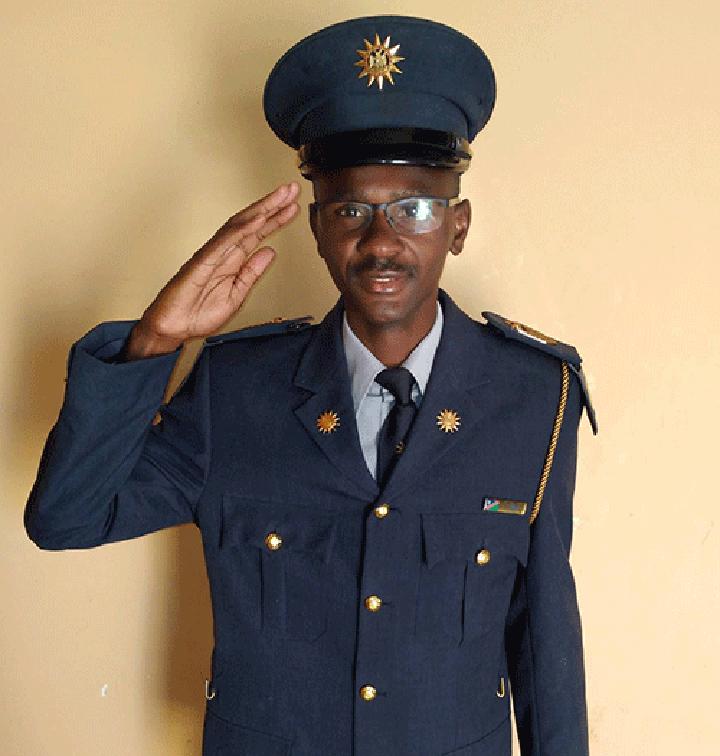Africa-Press – Namibia. Growing up in a village in northern Namibia, Edmund Taaru has always wanted to serve in the police force or military. From a tender age, he has the conviction that to serve society in a meaningful and impactful way, one needs to be a law enforcer.
Narrating his childhood dream, Taaru said: “It was my dream to work for the government, particularly in law enforcement – and in this case, the Namibian Police Force or Namibian Defense Force.
“I am a career police officer and since my first grade at Emono Combined School; my dream was either to become a police officer or a soldier, and it came true in December 2010,” Taaru said.
He joined the public services immediately after completing grade 12 as a cadet constable by undergoing the basic police training course at Ruben Danger Ashipala Police Training Centre in Ondangwa.
After his six months of training, in June 2011, he was deployed to the crime prevention unit at the Ndiyona Police Station in the Kavango East region.
Later, he was transferred to the police national headquarters in Windhoek, attached to the Office of the Inspector General for Administration from March 2012 to January 2018.
He is currently attached to the crime prevention unit at the Windhoek police station with the rank of Sergeant Class 1. As the custodian of law and order, police officers have numerous and varied responsibilities.
“The responsibility of all law enforcement personnel is strictly the preservation of the internal security of Namibia. But as a trained police officer, my main responsibility is the investigation of any alleged crime and the maintenance of law and order,” Taaru said about his duties as a policeman.
Despite numerous challenges faced by most police officers, Taaru has no qualms about his job. “I’m well trained to work under pressure, and I do not stress at all about my job. I enjoy it very much, and I remain optimistic,” he said.
Taaru is a fanatic public servant, who is convinced that government, despite some flaws, is the best employer. “The government is the best employer in terms of fringe benefits. I am well paid and with benefits such as a pension, medical aid, housing subsidy and transport allowance.
“The public sector, in compliance with the Public Service of Namibia’s Act of 1995 and the Police Act of 1990, also develop their staff for future career development,” he said.
The academic-oriented Taaru grew up at Okaku-Kanangula village in the Okatana constituency, Oshana region. He is a media practitioner, with a diploma in public relations and an honours degree in media and political studies – both from the University of Namibia.
To horn his skills in the field, he has completed an intensive practical internship in public relations at the Ministry of Gender Equality, Poverty Eradication and Social Welfare in the Office of the Vice President and the Ministry of Home Affairs, Immigration, Safety and Security.
He currently works at the national broadcaster, NBC’s News and Current Affairs as a Radio and TV producer apprentice on secondment by the Office of the Inspector General of Police. These comply with the public service policy framework on internship and training.
Despite his effort to study and gain knowledge, Taaru thinks the police force is not benefiting from his critical media and communication expertise. “My expertise is not at all benefitting the police force and in particular the Ministry of Home Affairs, Immigration, Safety and Security because I am not properly deployed.
“I am deployed at the crime prevention unit at the Windhoek police station instead of being deployed for instance at the policy and planning directorate of the Namibian Police Force, where I will be doing research and devising organisational policies or at the public relation division as a media liaison officer, delivering promotional campaigns, media addresses, managing social media to enhance information dissemination to the public in compliance with Pillar One (Effective Governance and Service Delivery) of the Harambee Prosperity Plan on Social Media Use Policy,” he lamented.
Taaru has also completed a police advanced course – Supervision and Management for Sergeant and Warrant Officers at Pius Joseph Kaundu Police Training Centre.
Despite these professional discontents, Taaru said he is in the right place – in the civil service. He stressed that “I’m a proud police officer. I’m 33 years and still have 27 years left for me to go for retirement. Therefore, I do not have any intention to leave the public service, nor do I want to quit the Namibian Police Force. I want to grow in the rank and file of the police force indefinably”.
Taaru is an aspiring, author who is busy writing a book about media laws in Namibia. “When the time comes, I will launch it. Also, I can’t wait for 2022 to go register for my Master of Arts in Security and Strategic Studies still with the University of Namibia. Also, my wish is to become a commissioned officer of the Namibian Police Force one day,” he concluded.






